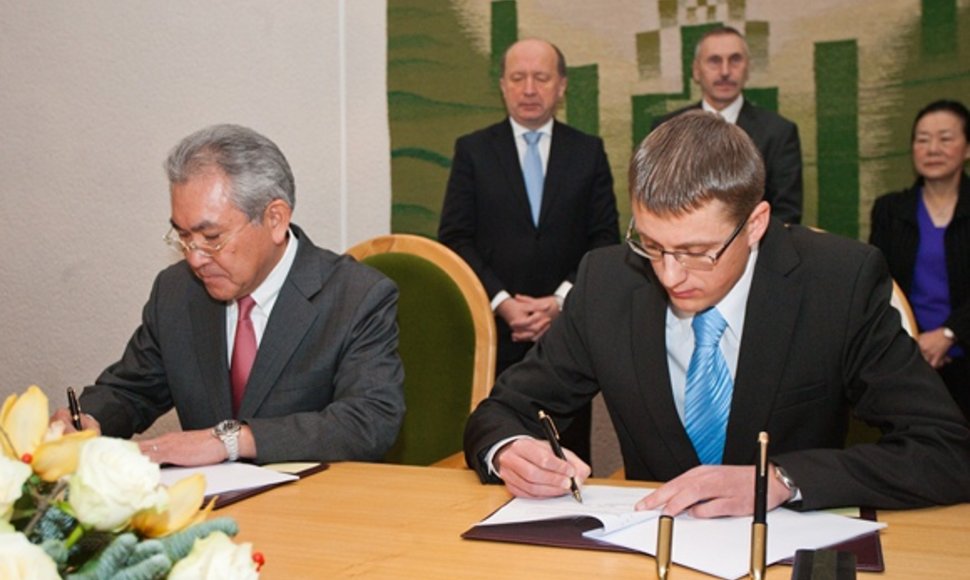Lithuania's parliament (Seimas) cancelled the requirement to sign the concession deal by Jun. 28 when green-lighting the construction of the nuclear facility and issuing a permission to sign the agreement with Hitachi last week.
"Yes. It was done so that we could continue talks with regional partners and Hitachi. Now the partners have to coordinate the timetable with regard to intermediate steps and the final date," Energy Minister Arvydas Sekmokas told BNS on Monday.
The concession deal with Hitachi should be signed by the end of this year at the latest, he said.
A formal legal deadline for the completion of direct talks with Hitachi and signing of concession agreement, i.e. 28 June, was set forth in the Concession Law. However, the Seimas cancelled the deadline when passing a package of bills on the construction of a new nuclear power plant on 21 June.
"It means that the negotiators have been given a possibility to continue talks with the regional partners and the strategic investor until agreeing on the shareholders’ deal and establishing of the project implementation company," Kęstutis Jauniškis, aide to the Energy Minister, told BNS.
The concession agreement should be signed by Lithuania, Hitachi and the project implementation company, which had not been established as yet, he said.
"After the completion of talks and establishment of a project implementation company, we also plan to sign a general contract with Hitachi-GE and other agreements required for the implementation of the project, alongside the concession agreement," Jauniškis said.
It is planned that the project company will initially have only two shareholders, VAE SPB and Hitachi Visaginas Project Investment, with Latvia's Latvenergo and Estonia's Eesti Energia expected to join in at a later stage.
VAE SPB (Visagino Atominė Elektrinė - Specialios Paskirties Bendrovė, or Visaginas Nuclear Power Plant - Special Purpose Vehicle) is a subsidiary of Lithuania's state-owned Visagino Atominė Elektrinė (Visaginas Nuclear Power Plant, or VAE), which is carrying out preparatory work for the Visaginas project.
Hitachi should own 20 percent of shares in the project company and Lithuania would hold 38 percent. Latvia and Estonia would take stakes of 20 percent and 22 percent, respectively. The ownership stakes could change somewhat if Poland joined the project.
The signing of the concession agreement would allow continuing with design, licensing and site preparation work, which would take about 30 months to complete.
That would be followed by tenders to select a construction contractor. After a contract with the winning bidder is signed and the parties to the project agree on financial commitments, a Final Investment Decision would be signed. The deadline for signing the FID is planned for 31 March 2015.
The Visaginas project is estimated to cost up to 5 billion euros at current prices and around 6.8 billion euros including interest, inflation and changes in the investment value due to exchange rate fluctuations. Under the plan, around 4 billion euros could be borrowed, and VAE, the Latvian and Estonian companies and Hitachi could provide 2.8 billion euros in their own funds.
Political scientists say that Visaginas-related laws adopted by the Seimas last week do not guarantee that the project will be continued and implemented the way the current government plans it. Experts point out that the current ruling coalition may lose its majority in the parliament after next October's elections and that the opposition Social Democrats did not vote in support of the package.
They say that such a scenario has a precedent. The energy holding company Leo LT, established under the Social Democrats, was dismantled amid doubts about its transparency after the Conservatives came into power.
All Social Democratic MPs, the Christian MPs and the majority of the Law and Order MPs and of non-affiliated MPs boycotted last week's vote on the Visaginas project. The opposition Labor Party voted in favor after the Seimas backed certain amendments proposed by them.
A group of opposition lawmakers have moved to hold a referendum on the new nuclear power plant project simultaneously with October's general elections,
A group of citizens is also initiating a referendum on the nuclear power plant construction. They have until 27 June to collect at least 300,000 signatures of eligible voters for the referendum to be held.
Currently, there are 137 operating nuclear power reactors in 15 EU member states.
2012 06 25
Lithuania will not sign concession deal with Japan's Hitachi in June
A concession agreement between Lithuania and Japan's corporation Hitachi, strategic investor in a new nuclear power plant planned to be built in Visaginas, will not be signed by the previously announced deadline of 28 June. It is expected to be signed by the end of this year.
Report mistake
Successfully sent
Thank you














